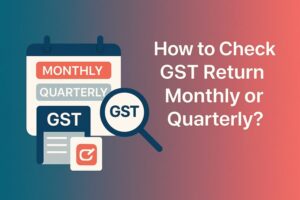Impact of GST on NGOs and Charitable Trusts
- 31 Aug 24
- 9 mins
Impact of GST on NGOs and Charitable Trusts
Key Takeaways
- GST requires NGOs and charitable trusts to classify activities as either taxable or exempt to determine their GST liability.
- Charitable activities related to public welfare, like education and medical relief, are generally exempt from GST under specific conditions.
- Organizations must manage their GST turnover and comply with registration requirements if they exceed the threshold limit.
- Goods sold by charitable trusts may attract GST unless they meet exemption criteria, requiring accurate record-keeping.
- Effective GST management for NGOs involves understanding exemptions, filing returns, and utilizing Input Tax Credit appropriately.
The implementation of the Goods and Services Tax (GST) in India has brought significant changes to various sectors, including non-profit organizations and charitable trusts. These entities, often engaged in public welfare and charitable activities, must navigate the complexities of GST to ensure compliance while continuing to serve their missions effectively.
GST on NGOs and Charitable Trusts
Non-profit organizations and charitable trusts are primarily focused on public welfare, making them different from profit-driven businesses. However, under the GST regime, they are subject to similar compliance requirements as commercial entities. This includes the need to file regular GST returns, maintain accurate records, and potentially charge GST on certain activities deemed as taxable supplies.
One of the significant impacts of GST on these organizations is the classification of their activities as either taxable supplies or exempt supplies. For instance, certain charitable activities may qualify as exempt supplies, meaning they are not subject to GST. However, activities that involve the sale of goods or services, such as running a training program for a fee or selling publications, might be considered taxable supplies and attract GST.
💡 If you want to pay your GST with Credit Card, then download Pice Business Payment App. Pice is the one stop app for all paying all your business expenses.
Charitable trusts and NGOs need to be aware of their GST turnover and whether it crosses the threshold limit for GST registration. If an organization’s annual turnover exceeds the prescribed limit, it must register for GST and comply with the associated requirements. This includes understanding the concept of outward supplies, where the organization provides goods or services that might be subject to GST.
Additionally, the Input Tax Credit (ITC) mechanism under GST can be both a benefit and a challenge for these organizations. While they can claim ITC on the GST paid for their purchases, it requires meticulous record-keeping and regular reconciliation of accounts. The ITC can be claimed only if the goods or services purchased are used for business activities that are taxable under GST.
Criteria to be Exempted from GST
To be exempted from GST, NGOs and charitable trusts must meet specific criteria outlined by the GST law. Generally, activities that qualify as charitable activities, such as those related to the advancement of religion, education, or relief of the poor, are exempt from GST. However, the exemption is not automatic and depends on the nature of the activities and the organization’s registration status.
Charitable organizations engaged in public awareness, skill development, family planning, or other public welfare initiatives may also qualify for GST exemptions. However, these organizations must ensure that their activities are not considered commercial activities, which could make them liable for GST. For instance, running a training program for a nominal fee might still be considered a business activity under GST if it is not exclusively charitable.
GST exemptions are also available for certain outward supplies made by charitable organizations, such as the sale of donated goods. However, the organization must maintain accurate records to prove that the supplies are exempt from GST. It is also crucial for these organizations to understand the concept of dynamic products and custom solutions, which might be part of their operations but could also attract GST if not classified correctly.
Moreover, the registration process under GST can be complex for charitable trusts, especially those with diverse activities. Organizations must ensure that they meet the criteria for exemption and are aware of any GST concessions that might apply to them. This includes understanding the impact of their annual turnover on their GST liability and ensuring compliance with GST laws to avoid penalties.
What is a Charitable Activity Under GST?

Under GST, charitable activities are those that provide relief to the poor, education, medical relief, or the advancement of religion or spirituality. These activities are generally exempt from GST, provided they meet the specific conditions set out in the GST law. For instance, services provided by an entity registered under Section 12AA of the Income Tax Act, 1961, by way of charitable activities are exempt from GST.
However, not all activities conducted by charitable trusts and NGOs qualify as charitable activities under GST. For example, commercial activities or business activities conducted by these organizations, even if the proceeds are used for charitable purposes, may not be exempt from GST. This distinction is crucial as it affects the organization’s GST liability and its ability to claim Input Tax Credit.
Organizations involved in charitable activities should also be mindful of their business model and how it interacts with GST regulations. For instance, if an NGO provides training programs or runs a skill development center, it must evaluate whether these activities qualify as charitable or if they should be classified as taxable supplies. The classification impacts not only the GST liability but also the organization’s financial planning and the strategies it uses to remain compliant.
In addition, NGOs and charitable trusts engaged in the advancement of religion or spirituality should ensure that their activities align with the definition of charitable activities under GST. This includes understanding how GST applies to their outward supplies and whether they can claim exemptions. The verification of customers’ stories, especially in sectors like public awareness or homeless children welfare, also plays a role in ensuring that the activities are recognized as charitable and not commercial.
Goods Sold by a Charitable Trust
The sale of goods by a charitable trust is another area where GST implications need careful consideration. Generally, goods sold by a charitable trust, especially those donated to the trust, are exempt from GST. However, this exemption is subject to specific conditions, such as the nature of the goods and the purpose of their sale.
For example, if a charitable trust sells books or handicrafts made by its beneficiaries, the sale might attract GST if the turnover exceeds the exemption threshold. Similarly, if the trust engages in commercial activities, such as running a canteen or selling tickets to events, these activities are likely to be considered taxable supplies, requiring the trust to charge GST.
Charitable trusts must maintain an accurate record of all goods sold, including details of whether the goods were donated or purchased. This is crucial for claiming any applicable GST exemptions and for complying with the requirements of filing GST returns. Additionally, trusts must be aware of the input tax credit rules and how they apply to the goods sold.
In some cases, the sale of goods by a charitable trust might be part of a broader strategy for dynamic product offerings or custom solutions aimed at fundraising. In such scenarios, it is essential to understand the GST implications and how they interact with the trust’s overall business model. For instance, if a charitable trust sells digital products or engages in activities across sectors, it must evaluate whether these activities are charitable or commercial, as this determines the GST treatment.
Charitable trusts and NGOs need to stay informed about industry trends and the evolving GST landscape to ensure compliance and to make the most of available GST concessions. By understanding the nuances of GST as it applies to their operations, these organizations can continue to focus on their mission while managing their tax obligations effectively.
 By
By 
















